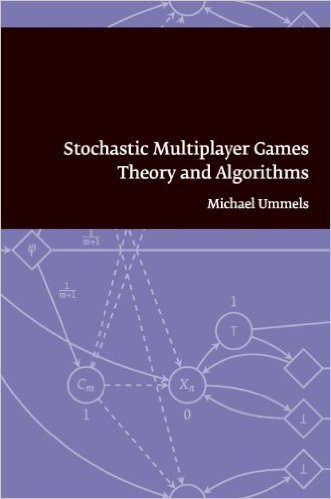
Stochastic Multiplayer Games: Theory and Algorithms
Stochastic games provide a versatile model for reactive systems that are affected by random events. This dissertation advances the algorithmic theory of stochastic games to incorporate multiple players, whose objectives are not necessarily conflicting.
Tag(s): Game Theory
Publication date: 09 Feb 2014
ISBN-10: 9085550408
ISBN-13: 9789085550402
Paperback: 174 pages
Views: 11,473
Type: Thesis
Publisher: Amsterdam University Press
License: Creative Commons Attribution-NonCommercial-NoDerivs 3.0 Unported
Post time: 09 Dec 2016 02:00:00
Stochastic Multiplayer Games: Theory and Algorithms
 Stochastic games provide a versatile model for reactive systems that are affected by random events. This dissertation advances the algorithmic theory of stochastic games to incorporate multiple players, whose objectives are not necessarily conflicting.
Stochastic games provide a versatile model for reactive systems that are affected by random events. This dissertation advances the algorithmic theory of stochastic games to incorporate multiple players, whose objectives are not necessarily conflicting.
Publication date: 09 Feb 2014
ISBN-10: 9085550408
ISBN-13: 9789085550402
Paperback: 174 pages
Views: 11,473
Document Type: Thesis
Publisher: Amsterdam University Press
License: Creative Commons Attribution-NonCommercial-NoDerivs 3.0 Unported
Post time: 09 Dec 2016 02:00:00
Share — copy and redistribute the material in any medium or format
The licensor cannot revoke these freedoms as long as you follow the license terms.
Click here to read the full license.
Michael Ummels wrote:The last decades have seen an immense amount of research on the algorithmic content of game theory. On the one hand, a new subject called algorithmic game theory has emerged that is concerned with the study of the algorithmic theory of finite games with multiple players. On the other hand, infinite and, in particular, stochastic two-player zero-sum games have become an important tool for the verification of open systems, which interact with their environment.
The aim of this work is to bring together algorithmic game theory with the games that are used in verification by extending the algorithmic theory of stochastic two-player zero-sum games to incorporate multiple players, whose objectives are not necessarily conflicting. In particular, this work contains a comprehensive study of the complexity of the most prominent solution concepts that are applicable in this setting, namely Nash and subgame-perfect equilibria.
Tweet
About The Author(s)
Michal Ummels graduated from RWTH Aachen in January 2010. Now he is a research associate at the German Aerospace Center (DLR). Until June 2009, he was involved in the DFG Research Training Group 1298.

Michal Ummels graduated from RWTH Aachen in January 2010. Now he is a research associate at the German Aerospace Center (DLR). Until June 2009, he was involved in the DFG Research Training Group 1298.